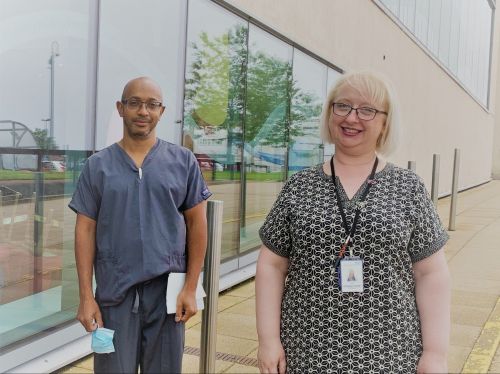We are delighted to announce that the Pancreatic Cancer Rapid Diagnostic Service (RDS) at East Lancashire Hospitals NHS Trust has been shortlisted for a Macmillan Professionals Excellence Award as recognition of their outstanding contribution to cancer services.
The service is part of a Lancashire and South Cumbria wide initiative designed to support earlier diagnosis in pancreatic cancer and has been shortlisted in the ‘Integration Excellence’ category. The award recognises teams who have improved the coordination of services and enabled integration across settings such as acute, primary, social and voluntary services to provide a seamless experience for people living with cancer.
The ELHT Cancer Services Team was nominated for their collaborative working with colleagues including diagnostic specialists, biomedical scientists and clinicians. They also work closely with representatives from the Lancashire and South Cumbria Cancer Alliance, Primary Care Networks and 3rd sector organisations, Pancreatic Cancer Action and Pancreatic Cancer UK.
The successful collaborative work has meant that an average wait time for a patient to be diagnosed with pancreatic cancer has reduced considerably following GP referral.
In England, 79% of pancreatic cancer patients are diagnosed at a late stage meaning one in four who are diagnosed with the disease sadly die within 28 days due to late stage diagnosis.
Vicki-Stevenson Hornby, a Pancreatic Specialist Nurse within the team, was amazed to hear of their nomination. She said:
“The Pancreatic RDS is the epitome of effective team working. It is a service which works to achieve earlier diagnosis of a cancer type where 80% of patients are diagnoses at a non-curative stage of the disease.”
“To work within a team striving to reach earlier diagnosis for people and to start to see the positive impact which this is having is acknowledgement enough. To then receive this award nomination and to be shortlisted, raises the profile of this work and allows the potential for other areas to follow, which will positively impact on achieving earlier diagnosis for more people. That is the real reward and something the whole team is immensely proud of.”
The team are now exceeding national targets for diagnosis waiting times, with NHS England and Improvement setting a national expectation that patients will wait no more than 28 days for a fast diagnosis.
Daren Subar, Clinical Lead for the Pancreatic Cancer Rapid Diagnostic Service, said: “The Rapid Diagnostic Service shows the importance of team working across primary and secondary care. We are seeing clear improvements for patients through the effective collaborative working. The nomination for this excellence award raises the profile of this important and effective initiative which, in turn, raises awareness of pancreatic cancer which is vital in terms of achieving earlier diagnosis.”
Although the team are working hard to diagnose faster, there is still lots more work to be done. The most common symptoms of the disease are jaundice: the whites of your eyes or skin could turn yellow, you may also have itchy skin, darker pee or paler poo than usual; loss of appetite or losing weight without trying to do; back pain; nausea or vomiting or a persistent change in bowel habits. If you have any of these symptoms, it is important to contact your GP as soon as possible to be checked out.
Following being shortlisted, the team will now prepare to give a presentation in early September before the winners are revealed at a ceremony later this year.



